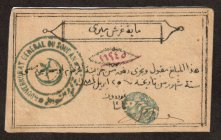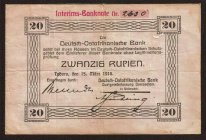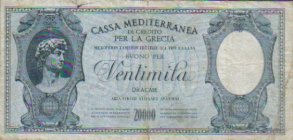Siege Notes - Windows to the Past - Part II
 Part II discusses the sieges of Khartoum in Africa, famous for the defeat of the British forces under General Gordon; Koffyfontein, O'okiep and Mafeking during the Boer War and finally the siege of the Ottomans in their mountain fortress at Scutari in modern day Albania.
Part II discusses the sieges of Khartoum in Africa, famous for the defeat of the British forces under General Gordon; Koffyfontein, O'okiep and Mafeking during the Boer War and finally the siege of the Ottomans in their mountain fortress at Scutari in modern day Albania.
Click to download PDF here.
A Monetary History of German East Africa
 From time immemorial Europeans sought to explore and exploit foreign lands for their own benefit. The wealth of these lands, of course, flowed to the conquering power doing little for the natives who were thus "colonized". By the 1860s European attention was drawn to the continent of Africa, then in the process of discovery.
From time immemorial Europeans sought to explore and exploit foreign lands for their own benefit. The wealth of these lands, of course, flowed to the conquering power doing little for the natives who were thus "colonized". By the 1860s European attention was drawn to the continent of Africa, then in the process of discovery.
Britain, France, Germany, Italy, Belgium, Portugal and Spain all laid claim to African territory. This article explores how Germany came to colonize German East Africa, giving a detailed account of all coin issues - both governmental and private. German East Africa became a very profitable and well ordered colony, with an outstanding monetary system of its own. When World War I came along, the colony found itself isolated from the mother country, unable to rely on help from outside quarters. Relying upon national pride and a great deal of ingenuity, the Germans were able to resist the British invasion until the homeland capitulated in 1918.
Of particular interest are the German East African bank notes which offer an infinite variety of issues which illustrate the will and resolve of the German and native Askaris to win the war and keep their colony intact.
Click to download PDF here.
Italy's Colonial Empire - A Paper Money Trail

This, the thirty-second in our series of articles on paper money, is the story of how Italy aspired to build a colonial empire of its own - and in large part succeeded.
Being one of the last European countries to unify in 1870, Italy was late in arriving to the "scramble for Africa" wherein other powers, notably Great Britain and France, were expeditiously establishing new colonies on the African continent. Shortly after unification, a wave of nationalism swept across Italy. Italians yearned for the past glory of the Roman Empire which, by 30 BC, had conquered all the lands surrounding the Mediterranean. They felt that much of this old territory was rightfully theirs. When Benito Mussolini came to power in 1922 as Italy's absolute dictator, he played upon this theme. The old Roman notion of Mare Nostrum (Our Sea) almost became a reality. Mussolini was bent upon pushing his 'Greater Italy' all the way across Africa from Tunisia, through Egypt and the Sudan to Italian East Africa on the Indian Ocean before the British stopped him at El Alamein, thus ending Italy's quest for an Italian Empire forever.
Click to download PDF here.